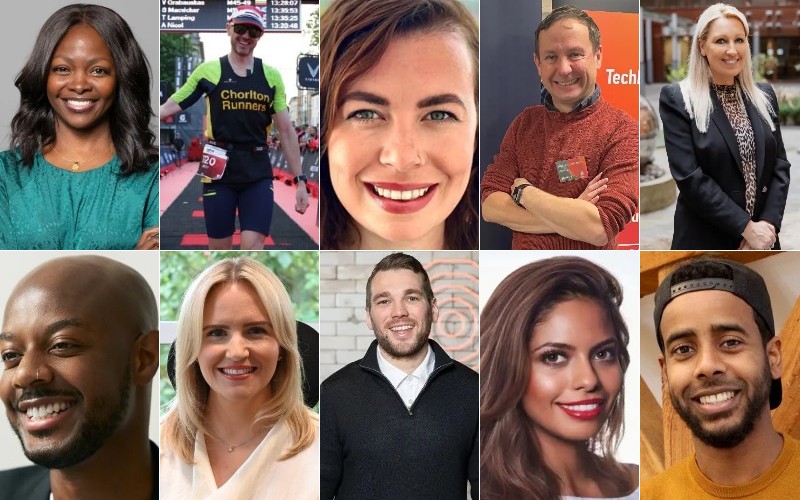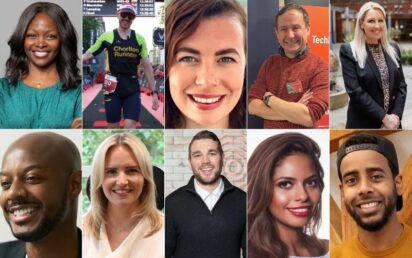Throughout 2023 the Star of the Week accolade has been awarded to the person or persons who most impressed TechBlast during the previous seven days.
The key criteria that the judges were looking for included growth, overcoming adversity and authenticity.
The full list includes founders, serial entrepreneurs and industry leaders, and covers all tech sectors.
The first TechBlast Star of the Week in 2023 was Anne Boden MBE, founder of Starling Bank. The list is in chronological order.
We have added two worthy entries to make a total of 50, with co-founders considered as one entry.
The profiles are accurate at the time of publication. Click on the names to read more about our Stars of 2023.
TechBlast Stars of 2023
Anne Boden MBE said at the start of the year that Starling Bank expected to quadruple its profits in 2023. In June the founder would step down as CEO after almost a decade in the “all-consuming” role – she remains on the board – after announcing that the neobank had in fact doubled revenue to £453 million and recorded a six-fold increase in pre-tax profits to £195m for the previous 12 months. “When I started Starling in 2014, I was told no one ever starts a bank, nobody wins market share and you’ll never make a profit. Today’s results prove them wrong,” she said.
Andrei Danescu (below) built his first robot in Romania aged 8 and came to the UK 13 years ago to study. He would go on to become an F1 engineer before co-founding BotsAndUs – since rebranded as Dexory – a London-based provider of real-time data insights using autonomous robots that measure, track and find goods across warehouses without manual intervention. “My biggest advice to startup entrepreneurs would be to make sure you have the grit and determination to follow through on your dreams,” he told TechBlast. “If you really believe in what you’re building, and you make it your life’s work, you will find a way.”
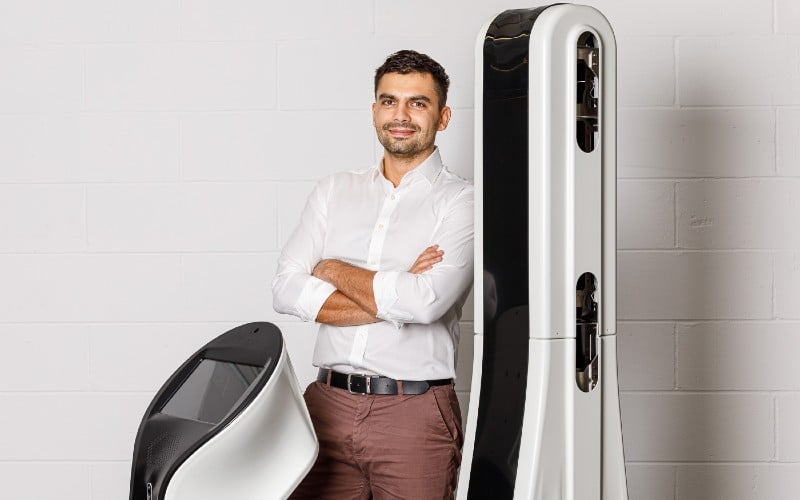
A specialist recruitment platform with a knack for finding hard-to-reach candidates on social media enjoyed blistering growth as companies look to go the extra mile to hunt the best people in a tight labour market. “Socially Recruited is at the forefront of a new era of smart AI-driven recruitment, and we are delighted to see it grow as it rises to meet the challenges of the sector,” said founder Ben Keighley of his London company.
Zandra Moore, CEO and co-founder of Panintelligence, said in January that it was a “completely different business to three years ago” following a strategic pivot. The business intelligence and predictive analytics company has been something of a flagship for the Leeds tech community in recent years. Moore also explained her ‘tech for good’ project No Code Lab – founded with Georgia Halston – during a hackathon at Climb23 in May (and showed off her dance moves!)
Beatboxing, scratch DJ & a #diversity rap freestyle…
A unique opening to #climb23 in Leeds.
Big up @D_List_UK @testamentonline @MelEllyard @InvestorLadder@zandramoore is certainly having fun! 🎤 pic.twitter.com/TACEyTlGYK
— TechBlast (@TechBlastUK) May 23, 2023
Tony Hughes is on a mission to turn the world of broadband in its head. The CEO of Altrincham-based 4th Utility is on a mission to install its fibre network into newbuild apartment blocks and is angry that the UK is 45th in the world for broadband speed.
One of the great benefits of entrepreneurship is the ability to write your own story, free from constraints found in traditional careers. Sadly, if you are from an ethnic minority, this can be especially valuable. “I’ll often talk to friends of mine who work in mainstream corporate jobs, and I hear about the challenges they go through as ethnic minority employees,” Ismael Dainehine (below), founder of Givematch, told TechBlast. “Entrepreneurship is a great equaliser, and you’re rewarded based on how much value you’re putting into the world. I feel like it’s shielded me from many of the prejudices people feel in other jobs.” When you donate via Givematch, you’re given a personalised link: if you get two friends to donate through that link, your initial donation is doubled through match-funding from corporate companies. In 2022, it raised more than £10 million for charities around the world.
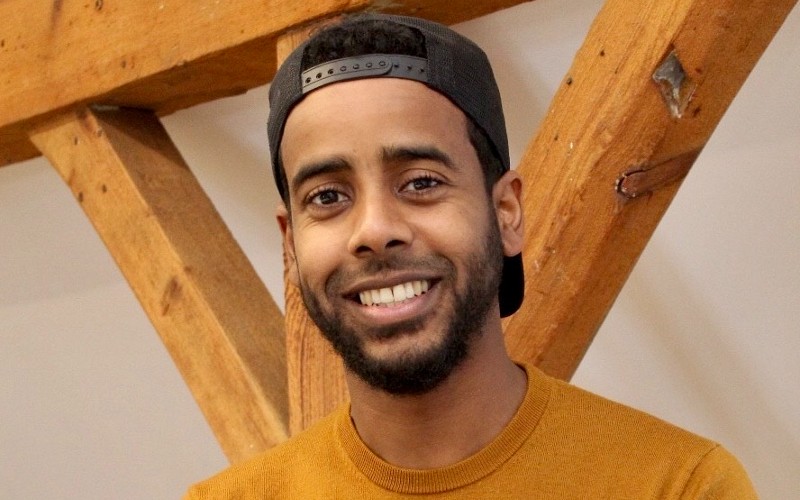
Zapmap, an app and digital platform for electric vehicle drivers, was spun out as a separate brand from Next Green Car when the chargepoint map became the most popular page on its website. COO and co-founder Melanie Shufflebotham told TechBlast how it was bootstrapped until 2019 amid a ‘chicken and egg’ situation with EVs. Zapmap would go on to be ranked No.1 in December’s TransportTech 50 on BusinessCloud.
Zapmap – search for EV charging points, plan journeys and pay for charging with Zapmap.
The United States is an appealing market to UK startups, given our shared first language and its population of around 330 million. However competition is fierce Stateside – and the differences between our healthcare systems can also make establishing a foothold there tricky. Impressive, then, that MedTech Scan.com, led by CEO Charlie Bullock, managed to gain traction in less than a year.
Deirdre Mc Gettrick, CEO of eCommerce marketplace ufurnish.com, spoke to us of the importance of highlighting female investors. The London-based startup, a search and discovery platform for home furniture and furnishings, unveiled a £3.4m seed funding round on International Women’s Day.
Atom Learning, second on BusinessCloud’s EdTech 50 ranking, is the UK’s largest EdTech platform for Key Stage 2 students. Founded in 2018 by Alex Hatvany and Jake O’Keeffe, the platform helps over 90,000 primary school children improve their learning and prepare for secondary school entrance exams. After bootstrapping for over three years until it became profitable, Atom raised $25m from SoftBank – the largest Series A round ever secured by a UK-based EdTech platform.
There’s no greater example of Paul Williams’s ethos to “do the right thing” than during COVID, when the niche insurance provider moved quickly to provide cover for fitness instructors suddenly forced to operate online. They spent a weekend rewriting their product, had a tech team deploy it on the Sunday and by the Monday morning it was live. Online training cover was provided free of charge and, that evening, Prime Minister Boris Johnson announced the first lockdown. “Days later I was getting emails from people saying I’d saved their livelihoods – and that’s what it’s all about,” Williams told TechBlast.
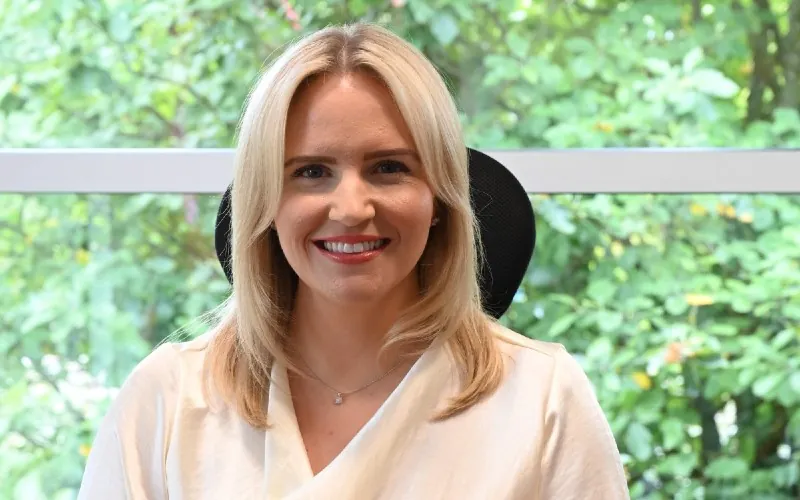
Samantha Rutter-Bryant (above) became CEO of Solihull company Open Study College at age 29 – and has had to deal with several preconceptions during her career, not only those around her gender. “People would often assume they were meeting a man when they heard my name is Sam – that could sometimes be tough,” she told TechBlast. “Walking into a meeting with men a lot older than me, and often more experienced, also used to be intimidating… whether sitting on judging panels for industry awards, or attending important meetings, I often found myself the only woman in the room and feeling like I had something to prove.”
A former NHS neurologist told us his mental health platform is saving lives – and that stories from users often bring tears to his eyes. Henry Majed says MyMynd has been developed to make a real impact on mental health during a time of overwhelming uncertainty. He was motivated, too, by a close friend ending their own life 25 years ago, prompting him to believe there was a better way of dealing with mental health issues. “We should be able to support people, but if you don’t realise there’s a problem, you don’t seek help.”
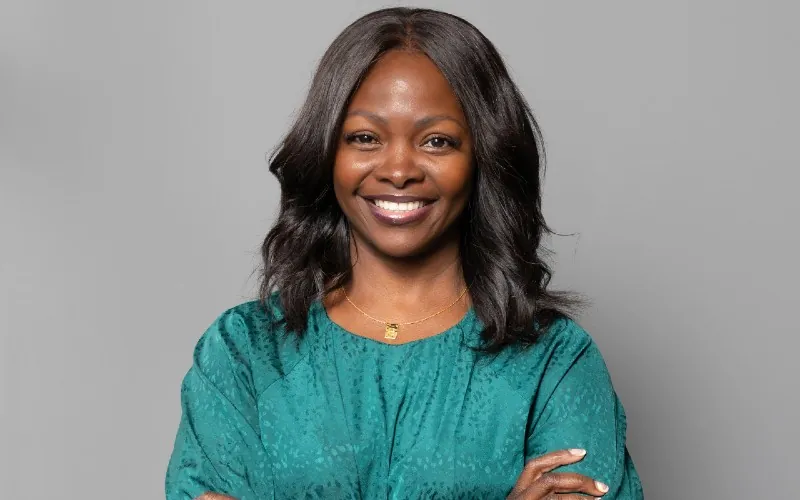
Patience Tucker (above) is CEO of wi-Q and mother of two young boys – and has never shied away from the reality of balancing family life with building a fast-growing business. “The number of times that I’ve been on a call while breastfeeding or had my baby in a sling… with big-name clients too!” she told TechBlast in April. “I’m not going to apologise for that because the alternative is that you don’t get my time and you don’t get the business moving forward.” She also spoke of the importance of CEOs always leading with integrity.
Leicester entrepreneur Leanne Bonner-Cooke MBE founded Evolve-IT Consulting back in 2007 after finding herself limited by glass ceilings in her corporate career. She was awarded an MBE in 2017 for services to women in business then in 2020 handed over the reins in a management buyout, having founded e-bate – a software platform helping companies across the supply chain to manage their rebate and price incentive schemes – in 2018. Before stepping down as CEO for a ‘digital detox’ in June, she spoke of the importance of people in her business: “We are a piece of software, true – but we are people manufacturing that software; we are people selling that software; and the people they sell it to use that software.”
Nick Richardson founded Manchester firm The Insights Family – ranked No.1 on BusinessCloud’s MarTech 50 – to provide real-time market intelligence on the attitudes, behaviour and consumption patterns of kids and parents for global brands including Amazon, the BBC, Danone, Disney, F1, Havas, Kraft, LEGO, Mattel, MediaCom, Nintendo, Pokémon and Warner Bros. It now collects market intelligence on more than 56,000 brands and IPs across six continents, 22 countries and 28 verticals every year.
A great idea doesn’t always pan out into a great business – but if you stay true to that original vision, you can give it every chance of success. Capital markets specialist Khalid Talukder, formerly of UBS, Citi & Deutsche Bank, founded DKK Partners with RBS and Citi veteran Dominic Duru in 2020. The FinTech company specialises in emerging markets and foreign exchange liquidity – allowing businesses to manage currency risks. DKK saw 60% growth in revenue in 2022, surpassing £100 million.
As a company grows, the conventional approach is to implement a management structure with a clear hierarchy of reporting. But is this even necessary? Applifting is a global software company founded in 2014 with bases in Prague, Czech Republic and the Level 39 tech community in London’s Canary Wharf. It has grown its team to 200 employees and contractors – but “there are no managers!” UK CEO Jan Hauser (below) added: “Everyone is treated as an equal, and everything is transparent and open to discussion. We make decisions together – making sure every voice, opinion, and concern that wants to be heard is, in fact, heard.” The company has a ‘Council of Elders’ which consists of six elected people tasked with the direction of the company as a whole.

Craig Kennedy, the globetrotting CEO of Cambridge University spinout Inotec, is growing its NATROX® O₂ device around the world. Smaller than an iPhone, it uses pure oxygen to cure the wounds of patients and featured at No.1 on BusinessCloud’s MedTech 50 ranking for the last two years. He told us: “If patients are happy, doctors are happy, clinicians are happy, and you sell a lot and get reimbursement, your shareholders will be happy. At the end of the day, we can’t make our shareholders happy without focusing on our patients.”
Inotec – NATROX® O₂ device heals wounds with humidified oxygen
When their globally acclaimed project to prevent suicide and promote wellbeing failed to get off the ground, friends Jak Spencer and Ralf Alwani set out to address what had gone wrong. The result of that soul-searching is Belfast-based tech business Polyloop, which aims to transform the public sector and closed a £1.3m first funding round – one of the highest valuation seed rounds out of Northern Ireland in the previous 12 months.
The idea of ‘disruptive’ technology seems ingrained into the psyche of the tech sector. But does innovation need to fully fly in the face of the market, or instead look to complement it? Bolton-based Near-Life’s immersive technology authoring tool allows people to create branching gamified storylines, boosting engagement and retention of information. With a growing user base in over 12 countries, including Fortune 500 clients, international not-for-profits and leading education providers, Near-Life is a trailblazer – but it didn’t go in with all guns blazing, CEO Mike Todd told us.
When Pete Sayburn and his fellow co-founders sold Market Gravity to Deloitte in 2017, it vindicated eight years of painstaking growth (running an agency is a time-consuming process as it is). After three years as a partner at Deloitte Digital, it was time for Sayburn and his co-founders to launch their next London venture – global marketplace Studiospace, initially known as Studioworks – and this time they would build something more scalable and technology-enabled. “Agencies are often held back in their growth by the linear process of sell a project, deliver a project, then asking: what are we going to do next?” he told us.
When Mark Halpin lost his father at the age of 21, his world was turned upside down. “The pain was like petrol on the fire to keep improving myself,” he told TechBlast. “My perspective changed beyond words, plagued by the fear that I might also expire at the age of 40. Life suddenly felt very short, and I didn’t want to waste it.” Fast forward to 2023 and his company CloudCoCo plc has 140 employees, over 1,000 customers, £25m turnover, and its sights set on £100m.
Prominent Saudi scientist Dr Wareed Alenaini (below) has worked with three prominent governments, including the administration of former Prime Minister Boris Johnson. It did not pan out how she hoped – “there is a long cycle of bureaucracy” – and so she decided to found Twinn.health, the London-based MedTech behind an AI-driven imaging platform that aims to revolutionise the early detection of age-related diseases.

A new FinTech platform is shaking up angel investing in the UK by aiming to address the current gender gap. Obu, the brainchild of female entrepreneurs Sarah King and Claire Dunn, connects eligible angels with female-founded businesses. The duo’s successful campaign in 2021 – #overbeingunderfunded – brought to light the inbuilt inequalities in the investment sector for women-founded business and succeeded in changing the legislation around access to Seed Enterprise Investment Scheme funding.
Former Twinkl C-suite duo Amy Whitell and Pete Casson founded Collctiv, an app that helps group organisers collect money for activities and large gifts through simplifying the collection and payment process, in 2019. The startup really took off in 2023: it featured on TechBlast’s Manchester Startups 2.0 list, topped BusinessCloud’s FinTech 50 and featured in a LinkedIn documentary series of startups cracking America, while Whitell spoke on our panel at pro-manchester’s Trailblazing Tech conference and was centre stage at the first edition of FUEL Manchester at KPMG, and Casson ended the year on BusinessCloud’s Demystifying Tech podcast special ‘The State of UK FinTech’.
There is a tendency to equate tech startup success with founders working long, hard hours. While time is among the most valuable commodities held by any startup, Beckie Taylor says the idea that you must devote your entire life to entrepreneurship is false. Taylor and co-founder James Heggs sold Tech Returners in February. It is continuing to operate under its existing brand, with the duo joining the senior leadership team of acquirer Northcoders. “Having scaled a business over five years whilst raising two very young children I want to bust the myth that you need to work 60-hour weeks to be successful,” the CEO told TechBlast. “Our business is where it is as a result of building a very talented team – all of whom have contributed massively and shaped it into what it is today.”
Al Gerrie founded ZigZag Global in 2015 after witnessing ever-increasing product returns over two decades in the retail industry – and the problem has only worsened since that time. A SaaS platform that helps retailers manage and resell returned stock in local markets – via a white-labelled returns portal that links directly from their website – it has enabled customers in 130 nations to return items. It processes around 50 million returned orders a year – around £1.5 billion worth of refunds.
The days of ‘hyper-growth’ startups are receding somewhat as investors increasingly look for more grounded businesses. Indeed, a cautious approach is paying off for Matthew de la Hey and Alex Hanson-Smith, who founded inploi back in 2016 as a marketplace serving the recruitment needs of the hospitality and leisure sector. The bootstrapped London startup, fifth on BusinessCloud’s inaugural TalentTech 50 ranking this year, was forced to pivot hard when COVID wiped out its customer base and pipeline. It now helps the likes of Compass Group and Wagamama to reach prospective candidates wherever they are online, and removes friction from the application process.
IPG Energy is a company with big ambitions. The London firm has developed Flameless Combustion technology which could enable some of the world’s most polluting industries – currently reliant on diesel generators – to operate with fuel-agnostic generators which offer energy security as well as clean energy. Toby Gill became CEO in 2020 to productise the technology, which was second on BusinessCloud’s EnviroTech 50 this year.
IPG Energy – Reinventing fuel-based power for the net-zero future
GigPig, another of our promising early-stage Manchester Startups 2.0 companies, was handed the Trailblazing Tech Award by pro-manchester after it was chosen by the audience. As editor of TechBlast, I helped to judge the early shortlist during a day of pitches and was impressed by Kit Muir-Rogers, co-founder and CRO of the live music marketplace which provides venues of all sizes with a streamlined way to search, book and manage entertainment in-house, while offering artists a free platform to find, play and get paid for gigs. It launched in 2022 with pre-seed investment and already represents more than 3,500 artists and 600 venues nationwide.
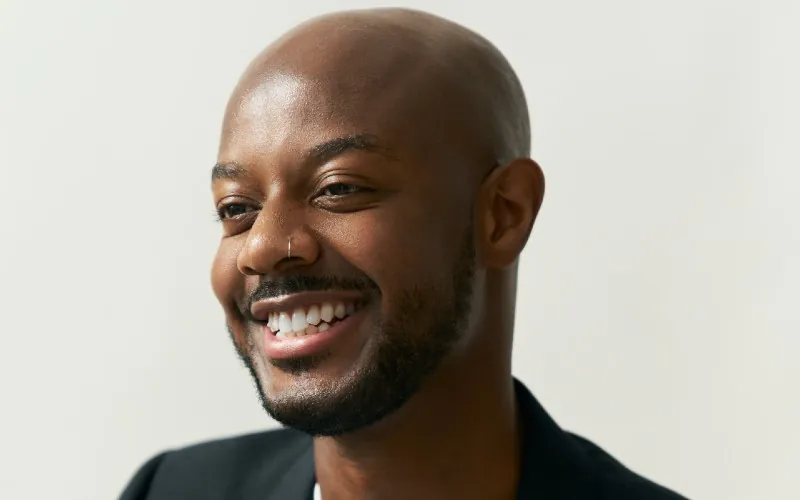
With eCommerce marketplace launches for JustEat, YOOX Net-a-Porter Group, Gianni Versace and Conde Nast’s style.com behind him, Richie Dawes (above) boasts an impressive CV. Yet the COVID pandemic found the technology consultant taking stock of his career and he moved into mental health as CTO of Clinical Partners before going on to found Nolea Health in 2022. The startup matches mental healthcare clinicians with vacant jobs across healthcare organisations and health systems. Its algorithm utilises the clinician’s profile data, such as experience, education and work preferences, with employers’ job requirements, location, and work culture, to increase the likelihood of successful matches and hires for short-term work opportunities.
The CEO of a RetailTech firm working with the world’s leading apparel and footwear brands says placing consumers at the centre of merchandising strategies pays dividends. London-based EDITED, which provides retail intelligence and AI-driven data insights, serves 48,000 retail industry professionals and works with retailers in 29 countries. The firm welcomed Doug Kofoid as CEO in April 2022 having grown ARR over 100% through client acquisition and platform expansion.
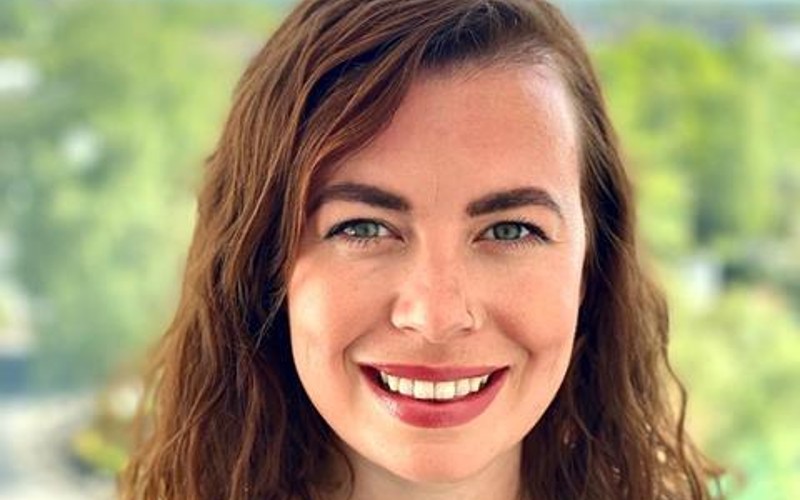
Eleanor Harry (above) has raised seed funding for HACE, which she founded in 2020 to tackle the worldwide problem of child labour in company supply chains. She describes the experience as the biggest challenge she has faced to date: “Investment teams are predominantly men, so there always seems to be an implicit disadvantage and inbuilt bias against female founders,” she told TechBlast. “There are specific female-focused funds in the investment landscape, but they typically invest in smaller ticket sizes which can seem tokenistic if larger tickets are still being given to men, by men. The investment rounds can feel like a minefield without women investors present in screening startups. I mostly tend to get questions about risk rather than opportunity, which I don’t see replicated for men-owned startups.” Harry, a contributor to international UN literature on child labour, also sits on the UN’s UK Global Compact Child Labour Working Group.
VIOOH CEO Jean-Christophe Conti says the London startup prefers to focus on values rather than the buzzword ‘culture fit’ when it comes to recruitment. “I don’t like to recruit on culture. You just end up recruiting the same profiles!” he told TechBlast. The firm, started by France-headquartered global out-of-home (OOH) advertising giant JCDecaux, has developed a supply side platform connecting programmatic buyers and sellers in a premium marketplace – making outdoor advertising more accessible to brands.
Marius-Cristian Frunza, founder and CEO of Schwarzthal Tech, is a PhD in mathematical finance at the prestigious University of Sorbonne. The author of several books on modern-day financial crime, he is an expert witness for litigations, disputes and financial crime cases in the British courts. His business has an AI platform, Wunderschild, that fights financial crime by gathering publicly available information and assessing potential customers’ connections with criminal or suspicious networks. It aims to revolutionise the way compliance works in the financial sector by shifting the approach from traditional ‘know your customer’ (KYC) policies towards a new concept – Know Your Network™.

Andy Nicol (above) is one of the nicest guys in tech. Yet beneath the thoughtful exterior is a steel which this year saw the Sputnik Digital MD run marathons in Seville and Manchester; his first Ironman triathlon; the boozy Marathon du Médoc; and, to cap it all, climb Mount Kilimanjaro – with a broken elbow sustained after coming off his bike during a wet Salford Triathlon (he finished the race). I was at his 50th birthday party in December but he insists it isn’t a mid-life crisis: “You’ve got to pick yourself up and plough on. It’s just resilience. Running a business, any business, is tough. Curveballs arrive daily and you deal with them. When the buck stops with you, you need to deal with issues, no matter how tired you are. Success, client promises and the team’s livelihood and wellbeing all depend on you getting the work in, and getting quality work back out again. This is anecdotal, but if you look at people who succeed in business, or the CVs of people who become managers, they tend to have competitive, active social lives. They run marathons… climb Kilimanjaro… and become successful people. They try new things. They’re curious. They know they have to work hard and organise and plan. And it’s not that you have to do one or the other – it’s that the same mindset leads to success in both disciplines. Do you sit and watch TV for three hours a day? Or do you go training, take a course, read something on AI? It’s just making good life choices. Even if things aren’t going according to plan, sitting there hoping things will change is not the answer – you have to take action.”
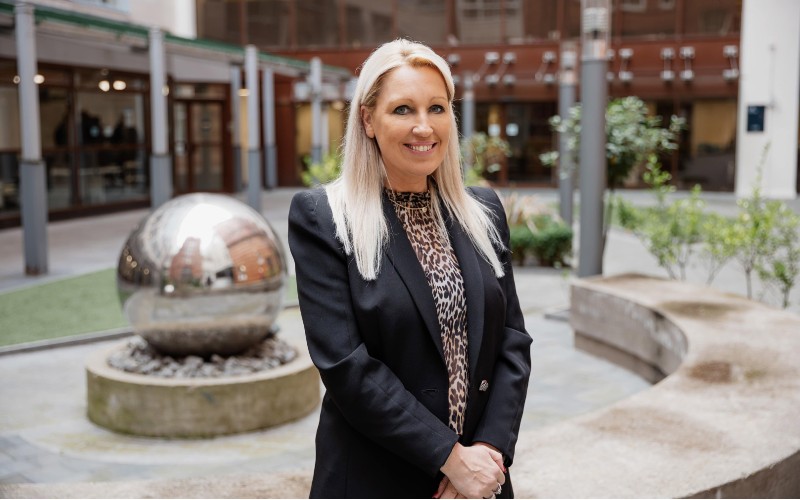
Janine Smith (above) is the director of GM Business Growth Hub, which launched in 2011 with a mission to enable growth, create jobs and improve lives in the Greater Manchester region. Its programmes have had a real, measurable impact, including over half a billion pounds in net benefit to be generated by 2025 – and provided the blueprint for a rollout of other Growth Hubs across the country.
Colin Gray is founder of Dundee startup The Podcast Host, which has served as a content hub and community for creators for more than a decade. He has since launched technology platform Alitu to take the pain out of launching a show.
Dr Ruby Pillai had a 15-year legal career behind her, latterly as senior solicitor at DLA Piper, before striking out in 2020 as founder of iWarranty, an EnviroTech which combines automation, artificial intelligence, blockchain and machine learning to streamline warranty management processes and extend the lifetime of products otherwise destined for landfill. In an interview with TechBlast, Dr Pillai pointed to the value of the ‘social capital’ she has built over her career.
Armalytix, which launched in 2020 and has raised £3.7m in seed funding – including backing from senior figures in the world of banking and finance – is a financial data intelligence firm at the forefront of redefining standards for financial checks and anti-money laundering practices. “Our [scaling] strategy is about both deepening our roots in what we do well and branching out to new avenues,” CEO and co-founder Richard McCall told TechBlast.
Paul Gedman’s goal is to disrupt the world of private equity. In a former life he headed up the beauty division at THG, overseeing 10 acquisitions. Then in 2020 he joined forces with another THG colleague, former CEO of Myprotein Andy Duckworth, to launch Manchester-based eComplete. A year later they made headlines with a £50m investment into eCommerce beauty business CurrentBody but have largely stayed under the radar – until now.
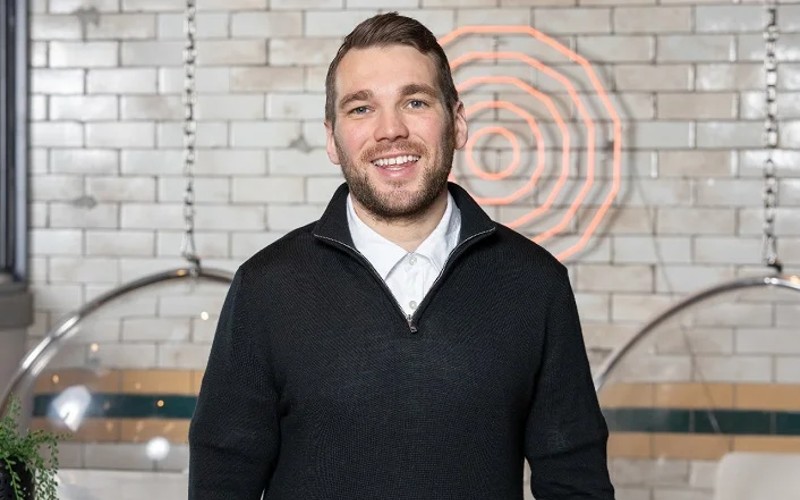
Manchester Startups 2.0 firm Vulse uses AI to help users create LinkedIn posts based on industry, trends and relevance. CEO Rob Illidge (above), who also founded social media agency Social Republic, recently secured a pre-seed round of angel investment while Cardiff-based software developer CarbonCode has taken a 10% stake in the platform. He shared its journey from inception; explained why he wishes he could do a ‘Dolly the sheep’; and said he is open to further angel investment.
Throughout gaming history, the giants of the industry typically emerged from Japan – think PlayStation, Nintendo and Sega – while Xbox was born within American tech behemoth Microsoft. Yet… “So many great games were made in the North of England and Scotland, but people just don’t see it!” Simon Benson, creator of PlayStation VR and director of immersive technology at IN4 Group, operator of innovation hub HOST, told TechBlast’s Launchpad podcast. “I was keen to shine a light on this. Individually, all these different businesses [creating games] want to be known, but they all try to do it on their own. I wanted to try and collect them together in some way and give them a central voice.” Benson says Gametech365, based at MediaCity, is a community which aims to provide aspiring games entrepreneurs with the connections necessary to survive in an industry with a sky-high failure rate.
Emma O’Brien is the successful entrepreneur behind growing digital transformation business Embridge Consulting, which serves public sector organisations plus the likes of Brunel University and AutoTrader. Stereotypes no longer bother her – but that was not always the case. “People tend to make a lot of assumptions about me, but at this stage in my career, it no longer makes a difference,” she told TechBlast. “It certainly did impact me earlier on: particularly as a young woman from a working-class background, I was regularly faced with a lot of scepticism. “One particular instance from my early 20s really stuck with me. I was working at a large organisation, and my mentor at the time commented on my broad cockney accent. I remember him telling me: ‘Emma, we need to address the way you talk if you’re going to progress in your career.’ For nearly two weeks I tried to change the way I spoke. This ended up with me sounding ridiculously forced, until I finally gave up and thought that if the way I spoke was going to limit my career, I’d just accept that.”
Plytime Learning, which featured on Manchester Startups 2.0, was founded by husband-and-wife team Ian and Lisa McCartney. When they found the maths homework their kids were bringing home was not fit for purpose, they took matters into their own hands… and when corporate director Ian fell seriously ill with Lyme disease, the enforced break would ultimately lead to the launch of the business. The personalised learning and support platform for children includes 24/7 personalised practice, answer reviews, help videos, real-time performance tracking – with machine learning highlighting strengths and weaknesses – and tokens and rewards to motivate children to improve.
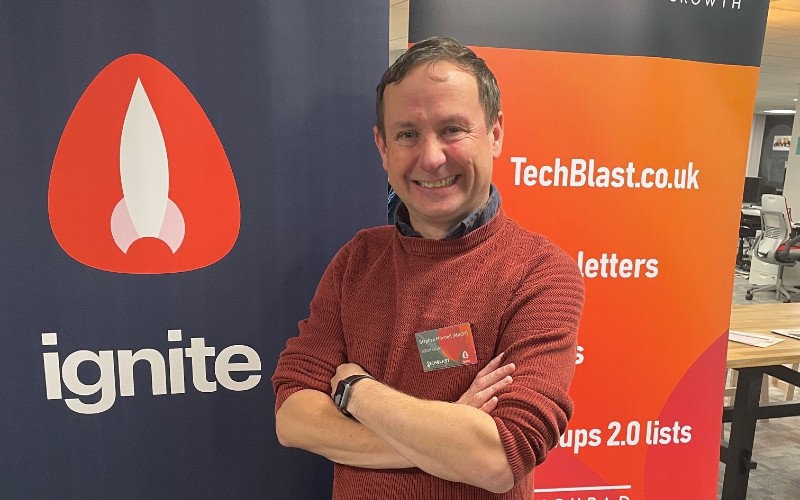
Stephen ‘Mitch’ Mitchell (above), founder of SQCDP.co.uk, beat 13 other businesses at a Pitching Night event based around our North East & Tees Valley Startups 2.0 list – produced in association with Ignite – after impressing a judging panel. The company is already working with a number of manufacturers in the North East to collect factory floor data and eliminates the use of spreadsheets, forms and whiteboards. A delighted Mitch told the audience of around 80 people at TusPark: “I’m from the North East and I’ve been around manufacturing for a long time. Moving into the tech scene in this last year I’ve seen the support that is there for everybody, seeing the people in there all helping, supporting and cheerleading each other.”
Jamie Hardesty, director of communications and ecosystem development at Sunderland Software City, was a judge at the Pitching Night in Newcastle. Former Tech Nation figure Jamie compiles the weekly Newcastle Tech Digest newsletter (we’ve never asked him whether he drew the logo himself) and is a respected figure in the region’s tech ecosystem. He has learned to walk again after breaking his back during a fall on a mountain walk.
Lorenzo Conti (below) is set to launch Scottish AgriTech startup Crover in the United States after winning a top prize at the annual Grow-NY Summit recently. The other six winning startups are based in North America. Its ‘grain swimming’ robotic technology helps grain storage operators reduce losses and maintain optimum storage conditions by remotely monitoring and maintaining quality.
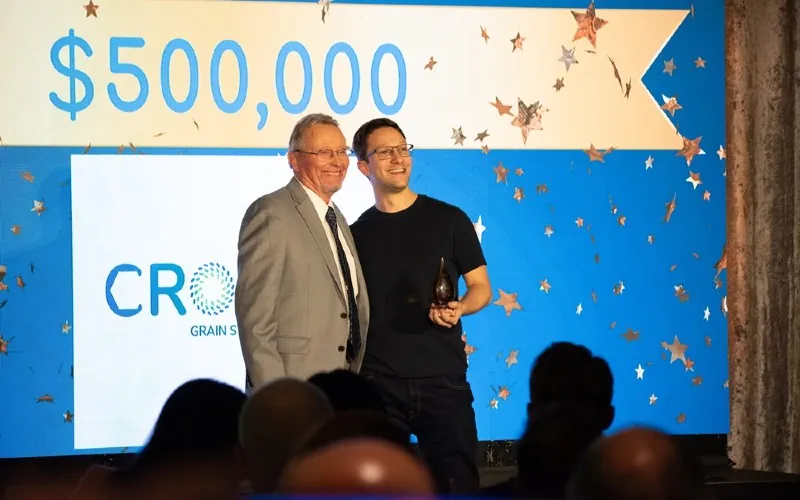
André Brown co-founded merchandising platform Attraqt in 2002 and served as CEO for 16 years – overseeing its IPO – before leaving the company and taking six months off before turning his attention to his next venture. Enter Advanced Commerce, founded in 2020, which placed fifth on BusinessCloud’s RetailTech 50 ranking this year, and has already grown to 40 clients. “When you do something a second time, you tend to do it much better, don’t you?” he told TechBlast. “You’ve learned all the hard lessons the first time around.”

